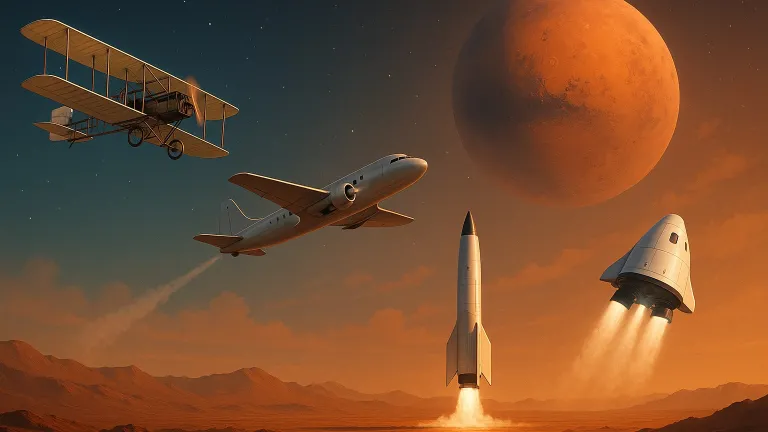Living Through a Century of Transformation

The explosion of information is perhaps the time when the understanding of Daniel’s end-time prophecies will be unsealed.
Within a single lifetime I have lived through one of the most astonishing periods of transformation in all human history. The world I was born into has changed in ways that would have been unimaginable just a century ago.
In 1903, the Wright brothers achieved the first sustained and controlled flight of a powered, heavier-than-air aircraft. Just 66 years later, humans walked on the moon—and we’ve continued to push even farther into space.
Communication experienced a parallel revolution. On May 13, 1897, Guglielmo Marconi made the first successful wireless radio transmission across open water. No wires—what a miracle! Today we are surrounded by thousands, if not more, invisible signals and nonstop transmissions of every kind. We’ve progressed from hand-delivered letters and simple telegraphs to real-time, global video calls. What began as dots and dashes evolved into voice, then images and now full-motion high-definition video. We carry live-streaming devices in our pockets—something that would have seemed like science fiction not long ago.
These technological marvels have become so routine that we rarely stop to appreciate how extraordinary they truly are.
Remembering what it used to be like
Throughout my life, I’ve witnessed the “before”—and I’ve lived through the amazing transformation to what we now take for granted.
I still remember the excitement of learning to write—first in the Cyrillic alphabet, then in the Latin alphabet. In fact, I learned to write my name in Ukrainian before I could write it in English. At four or five years old, it felt magical to form words with my own hand.
Later, in grade school, I was amazed by carbon paper. It felt like a personal printing press. The word “printer” didn’t exist yet. In middle school I discovered the typewriter and was captivated. I loved typing so much at a friend’s house that I would sit and type on his typewriter—even when I had nothing particular to say—just hoping that thoughts would begin to form.
Then came the computer—an entirely different kind of machine. In the early 1960s, computers filled entire rooms and needed elaborate cooling systems. They were slow, but revolutionary in their ability to process information. I was fascinated by programming and intrigued by what they could do. Since then, computing power has grown exponentially. Today, we can access global libraries of knowledge in seconds—an ability once reserved for dreams or science fiction.
Sudden technological advancement
While visiting the Computer History Museum in Mountain View, California, I saw a graph that has stuck with me. It showed the steady rise of computing speed and memory since the 1950s. Then suddenly—by about 2016 or so—the lines went nearly straight up. There seemed to be no end in sight. But it also left the question: what does all this lead to?
Now we’ve entered the age of artificial intelligence. I use AI regularly—to dictate, edit and refine. In fact, what you’re reading now began as spoken thoughts, later shaped and polished by AI tools. But make no mistake: the original ideas still come from the human mind. Artificial Intelligence can assist with language and structure, but it does not—and cannot—generate wisdom.
That’s what gives me pause.
Today’s children are growing up in a world that never knew the “before.” Many can’t read cursive; some never even learn to write by hand. I recently gave a birthday card to a teenager who looked at me and said, “I can’t read this. Please read it to me.” I was stunned. I had always assumed cursive was a basic form of communication. Clearly, not anymore.
Learning to think and write begins with learning to build thoughts—word by word. If that step is skipped, the foundation is empty. Without exercising critical thinking, the mind can atrophy—like an unused muscle—as machines take over the labor of thought and communication.
Too much progress?
There is also a growing divide between those who are fluent in today’s technologies and those who aren’t. AI can make our work look polished, but it does not stimulate the mind in the same way that composing, reflecting and creating do. The danger lies not only in what we gain—but in what we risk losing.
It makes me wonder: What will the next generation face? Can too much progress, too quickly, be more than we can for our society?
The prophet Daniel envisioned such a time that he called the time of the end. As he concluded his writing, God gave him this instruction:
“But you, Daniel, shut up the words, and seal the book until the time of the end; many shall run to and fro, and knowledge shall increase” (Daniel 12:4)
Isn’t this what we’re seeing today—people rushing helter skelter, with knowledge multiplying at an uncontrollable pace?
Our ultimate hope
Yet, there is hope. This explosion of information is also the time when the understanding of Daniel’s prophecies may be unsealed. The same tools that challenge our wisdom may also help us rediscover it.
Still, all this breathtaking progress comes with a sobering reality: everything we’ve built—civilization itself—could be destroyed in an instant. One reckless, trigger-happy power-hungry leader could unleash devastation on a global scale. The power to create has been matched by the power to destroy.
Jesus Christ warned us of this in His Olivet prophecy concerning the end time.
“For then there will be great tribulation, such as has not been since the beginning of the world until this time, no, nor ever shall be. And unless those days were shortened, no flesh would be saved; but for the elect’s sake those days will be shortened” (Matthew 24:21–22).
These are sobering thoughts—yet they are also filled with hope. God has not left us without guidance. He promises to preserve His elect and ultimately to bring salvation.
Just some thoughts from someone who’s watched the world change—more rapidly than any of us could ever have imagined.


